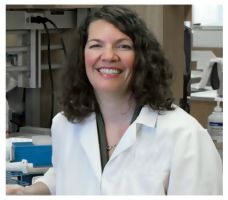
47 centres in 21 countries collecting data and samples, including first ever endometriosis explorations
Professor Stacey Missmer, co- Principal Investigator of WERF EPHect, presented exciting updates at the 14th World Congress on Endometriosis: 47 centres in 21 countries are now using the EPHect tools.
This exceptional uptake is only the beginning of the exciting advances, she shared with us today.
Engagement, collection, and collaboration
Across these centres, nearly 25,000 people (24,660 to be exact) have completed a clinical questionnaire utilising the WERF EPHect tool (EPQ). This means that they have generously provided information about their health, well-being, and struggles that is invaluable to discovery. At most centres, the questionnaires take 45 to 60 minutes to complete online, with 84% of participants completing them at a majority of the sites. What a community we have!
47 Centres in 21 countries (black dots) are using the WERF EPHect tools,
with 11 emerging centres in 7 additional countries (blue dots)
Further, the EPHect surgical form has been completed for 99% of the surgeries among participants – 4,396 surgical forms in all. That too is exceptional dedication. Combined with the collection of biospecimens, this is the largest rigorous data set in endometriosis ever collected. At least one specimen has been collected from these large numbers of participants:
First of their kind studies
Dr Missmer went on to share recent “first of their kind” studies, all utilising the EPHect tools:
- The Ibero-American Endometriosis Patient Association (PI: Idhaliz Flores) translated the EPHect clinical questionnaire into Spanish and have generated the first Hispanic/Latinx profile of people with endometriosis from 11 countries, allowing deeper comparisons across ethnicities and geographic regions within the Americas.
- The Endometriosis Clinical and Genetic Research in India (ECGR) study (PI: Rahul Gajbhiye) has launched studies of genetics, biomarkers, and also pregnancy outcomes among women with endometriosis across the whole of India with the EPHect clinical questionnaire translated into 5 regional languages intending that all women have an opportunity to share their journey.
- The Cyprus Women’s Health Research Initiative (COHERE) (PI: Nilufer Rahmioglu) launched the first large-scale study of women’s health in this Eastern Mediterranean region, enrolling nearly 8,000 women for data and sample collection via the EPHect tools.
- The MAR’A Project: Middle Eastern Women Research Association is the doctoral dissertation focus of Mira Mousa at the University of Oxford. Launching with a study in the United Arab Emirates, MAR’A endeavors to address reproductive health facilitated by EPHect tools across this region that comprises 23 countries with 7% of the world’s population: ~220 million women, and yet is represented in only 0.1% of the research in women’s health.
Funding successes
Desperately needed funding has been provided to several EPHect utilising international collaborations:
- Integrative Analysis of Genomic, Epigenomic and Phenotypic Data for Disease Stratification of Endometriosis
Principal Investigators Linda Giudice, Marina Sirota, and Stacey Missmer, bring together leading scientists and clinician investigators from the USA, UK, Spain, and Australia to explore endometriosis-specific DNA methylation signals in eutopic endometrium (funding from the US National Institutes of Health under grant R01HD089511).
- IMI-PainCare - TRiPP: Translational Research in Pelvic Pain
Principal Investigators of TRiPP, Katy Vincent and Jens Nagel, lead an unprecedented cooperation among 40 partners across 14 countries inclusive of hospitals, research centres, patient organisations, scientific societies and, industry (funding from the Innovative Medicines Initiative 2 Joint Understanding under grant agreement no 777500, with support from the European Union's Horizon 2020 research and innovation programme and EFPIA).
- What is Endometriosis? – the WisE Study
Principal Investigators Stacey Missmer and Asgi Fazleabas bring together participant data and samples from three large studies – two in the USA and one in the UK – with scientists from Michigan State, Harvard, and Oxford Universities to explore patient characteristics combined with blood and endometriosis tissue markers that define differences in symptoms, experiences, and treatment responses among people with endometriosis (funding from the US National Institutes of Health under grant R01HD094842).
Equally important to these growing EPHect tools utilising centres and research opportunities, Dr Missmer described other internationally collaborative studies including the IEGC, FEELING Study, MOMENDO, and TRENDO that include teams and data from 5 continents. While only a small portion of the information incorporated into these also large studies had incorporated EPHect tools, the clarity and detail of the tools ensures that results published by different groups can be compared more easily, allowing focus on true underlying biologic or sociologic differences rather than data or laboratory variability.
Dr Missmer concluded:
In endometriosis we know that one size has never fit all. In fact, discovery requires data from many patients and participants, who generously share their unique experiences.
It requires scientists and healthcare providers bringing together diverse expertise to use these harmonised data to improve diagnosis and personalised treatment. No one experience or perspective is enough to tackle endometriosis – but together we can and we are!
Watch professor Missmer's presentation
The EPHect tools
 The EPHect tools have been adopted and implemented across the globe!
The EPHect tools have been adopted and implemented across the globe!
This exceptional uptake of these harmonised tools is evidence of a global dedication to new diagnostic and treatment discoveries for those with endometriosis.
Further, there is clear support for the scientific rigour and collaborative opportunities that the EPHect tools offer, with research funding successes for multi-centre international studies utilising the tools having dramatically increased.
The EPHect tools have proven to be straightforward to use and implement; likely due to the multidiscliplinary, international expert effort that worked together to develop them. The clinical questionnaire is available in 17 languages.



